
 |
||||||
|
GAY
FILM REVIEWS BY MICHAEL D. KLEMM
|
||||||
|
Of Time And The City Strand
Releasing, Director/Screenplay:
Unrated, 74 minutes
Toto
Forever Director/Screenplay:
Starring: Unrated, 14 minutes |
City
Of Ghosts
Author James Joyce referred to the city of his birth as "dear dirty Dublin." Though he both loved and hated Dublin, his books detail the city with such lovingness that its streets could be recreated from his autobiographical prose. A similar attitide, this time directed towards Liverpool, can be found in Terence Davies' latest film, Of Time And The City (2008). |
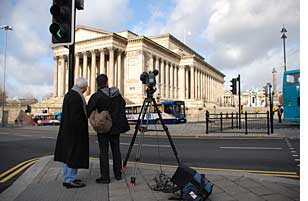 As
a filmmaker, Davies is renowned for mining his own life to supply the raw
materials of his art. His reputation lies with a trilogy of short films
based on his youth - Children (1976), Madonna and Child (1980),
and Death and Transfiguration (1983).In 2000, he enjoyed modest mainstream
success with an adaptation of Edith Wharton's The House Of Mirth,
but it would be eight years before his next movie. Known for his anger;
an interview cited in Davies' Wikipedia entry is titled after The Smiths'
song "Bigmouth Strikes Again." Of Time And The
City, narrated by the director, is described as being his
first documentary. As
a filmmaker, Davies is renowned for mining his own life to supply the raw
materials of his art. His reputation lies with a trilogy of short films
based on his youth - Children (1976), Madonna and Child (1980),
and Death and Transfiguration (1983).In 2000, he enjoyed modest mainstream
success with an adaptation of Edith Wharton's The House Of Mirth,
but it would be eight years before his next movie. Known for his anger;
an interview cited in Davies' Wikipedia entry is titled after The Smiths'
song "Bigmouth Strikes Again." Of Time And The
City, narrated by the director, is described as being his
first documentary. |
|
|
|
|
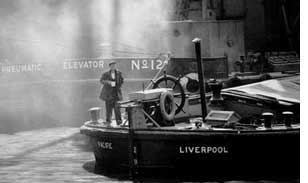 Of
Time And The City
is composed almost entirely of magnificent archival footage spanning almost
an entire century. Crowds roam Liverpool's beaches, factories and shipyards.
Decaying streets are complimented by equally ugly modern housing projects.
Rows and rows of concrete apartment buildings are accompanied by Peggy Lee
singing "The Folks Who Live On The Hill." Footage from the Korean War, and
troops returning home, is scored to "He Aint Heavy He's My Brother" by the
Hollies. References to The Beatles are brief and the filmmaker makes clear
his preference for the symphonies of Shostokovich and Bruckner. Any nostalgia
that the director feels is swallowed up by his regrets. Of
Time And The City
is composed almost entirely of magnificent archival footage spanning almost
an entire century. Crowds roam Liverpool's beaches, factories and shipyards.
Decaying streets are complimented by equally ugly modern housing projects.
Rows and rows of concrete apartment buildings are accompanied by Peggy Lee
singing "The Folks Who Live On The Hill." Footage from the Korean War, and
troops returning home, is scored to "He Aint Heavy He's My Brother" by the
Hollies. References to The Beatles are brief and the filmmaker makes clear
his preference for the symphonies of Shostokovich and Bruckner. Any nostalgia
that the director feels is swallowed up by his regrets. |
|
 Throughout
the film, Davies returns again and again to the Catholic Church. The institution's
proscriptions regarding sexuality frustrated the director as a young gay
man growing up in the late 1950s. His church offered no forgiveness, only
the promise that the devil "will get you in the end." He fondly remembers
a boy who put his hand on his shoulder and how he didn't want him to take
it away. The theme of the artist's awakening sexuality is not the focus
of his film but it is a recurring motif. Newsreels of Hollywood glitterati
attending gala film openings illustrate Davies' love for the movies. (Appropriately,
his film opens with curtains opening in a movie theater.) He speaks of the
silver screen's glorious escapism but also allows for the dark and formative
memories of seeing Dirk Bogarde as a gay man being blackmailed in 1961's
Victim. As an adolescent,
he watched masked, beefy wrestlers and begged God to deliver him from his
desires, all the while caught between the church and the law. Throughout
the film, Davies returns again and again to the Catholic Church. The institution's
proscriptions regarding sexuality frustrated the director as a young gay
man growing up in the late 1950s. His church offered no forgiveness, only
the promise that the devil "will get you in the end." He fondly remembers
a boy who put his hand on his shoulder and how he didn't want him to take
it away. The theme of the artist's awakening sexuality is not the focus
of his film but it is a recurring motif. Newsreels of Hollywood glitterati
attending gala film openings illustrate Davies' love for the movies. (Appropriately,
his film opens with curtains opening in a movie theater.) He speaks of the
silver screen's glorious escapism but also allows for the dark and formative
memories of seeing Dirk Bogarde as a gay man being blackmailed in 1961's
Victim. As an adolescent,
he watched masked, beefy wrestlers and begged God to deliver him from his
desires, all the while caught between the church and the law. |
|
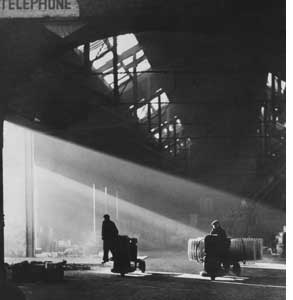 His
narration is tempered with heavy cynicism; consider his feelings towards
the monarchy. During colorful footage of Queen Elizabeth's 1953 coronation,
Davies is contemptuous of the extreme opulence on display during a time
when most of the nation was still living under rations in "some of the worst
slums in Europe," and refers sarcastically to the royal couple as "Betty
and Phil." (He suggests that the Scottish firemen giving the Queen a 21
hose salute are simply "taking a piss.") As his camera captures the interior
of an ornate cathedral, his words on the soundtrack provide bitter counterpoint.
Playfully, the next sequence involves a different kind of congregation,
enjoying "cocktails in Babylon," inside a de-consecrated church
that has been turned into a modern night club. His
narration is tempered with heavy cynicism; consider his feelings towards
the monarchy. During colorful footage of Queen Elizabeth's 1953 coronation,
Davies is contemptuous of the extreme opulence on display during a time
when most of the nation was still living under rations in "some of the worst
slums in Europe," and refers sarcastically to the royal couple as "Betty
and Phil." (He suggests that the Scottish firemen giving the Queen a 21
hose salute are simply "taking a piss.") As his camera captures the interior
of an ornate cathedral, his words on the soundtrack provide bitter counterpoint.
Playfully, the next sequence involves a different kind of congregation,
enjoying "cocktails in Babylon," inside a de-consecrated church
that has been turned into a modern night club. |
|
|
Davies visits and revisits his childhood, moving from past to present, and there and back again. This is not a History Channel documentary and should not be approached as such. Using his own words and also the verses of T.S. Eliot and other poets, (Joyce is also quoted), his deep, resonant voice is our guide through his labyrinthine memories. Charles Dickens began A Tale Of Two Cities by writing: "It was the best of times, it was the worst of times." These iconic lines sum up Terence Davies' rambling thoughts. Of Time And The City is a window into the artist's soul.
|
|
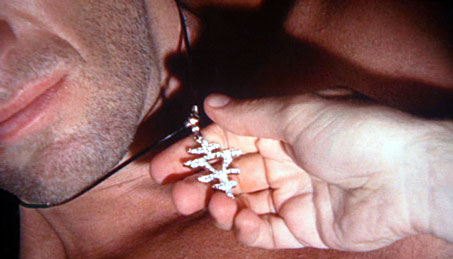 |
|
| Passion and lust can make people do strange things. Toto Forever, a short film written and directed by Roberto F. Canuto, is a dreamlike meditation about a doomed love affair. | |
 While
delivering a package, a young postman named Toto (Kylan James) discovers
an injured man laying next to an inground pool and tends to his wounds.
Mark (Kjord Davis) is in trouble with the mob and the two men flee together.
While resting on the side of the road, Toto gazes longingly at the handsome
fugitive. He touches the sleeping man's hand and leans over to kiss him...
and is surprised when the kiss is returned. While
delivering a package, a young postman named Toto (Kylan James) discovers
an injured man laying next to an inground pool and tends to his wounds.
Mark (Kjord Davis) is in trouble with the mob and the two men flee together.
While resting on the side of the road, Toto gazes longingly at the handsome
fugitive. He touches the sleeping man's hand and leans over to kiss him...
and is surprised when the kiss is returned. |
|
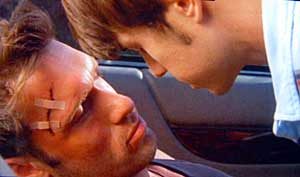 Toto
Forever
is only 14 minutes long and so we don't get to discover much about these
men. Toto functions like the widow in an old Western who falls in love with
the wounded gunslinger she nurses back to health. Mark could be a killer
for all we know, or perhaps he is just an ordinary guy who has gotten in
over his head. Toto resembles the nice boy next door, Mark is a little rougher
while still possessing a model's good looks. Toto may have just found the
man of his dreams or he may possibly be making the biggest mistake of his
life when he runs off with him. Toto
Forever
is only 14 minutes long and so we don't get to discover much about these
men. Toto functions like the widow in an old Western who falls in love with
the wounded gunslinger she nurses back to health. Mark could be a killer
for all we know, or perhaps he is just an ordinary guy who has gotten in
over his head. Toto resembles the nice boy next door, Mark is a little rougher
while still possessing a model's good looks. Toto may have just found the
man of his dreams or he may possibly be making the biggest mistake of his
life when he runs off with him. |
|
|
Toto Forever is sexy and suspenseful. Despite not being developed into a fully fleshed out movie, Canuto's short contains many pleasures. I look forward to the day when he directs his first feature film. |